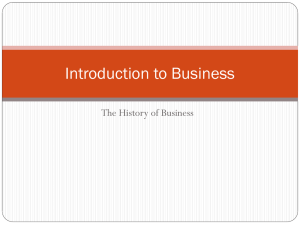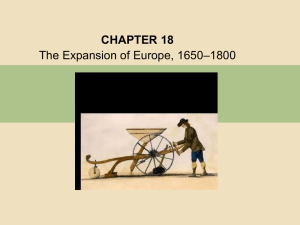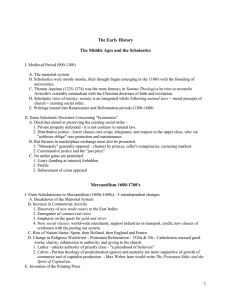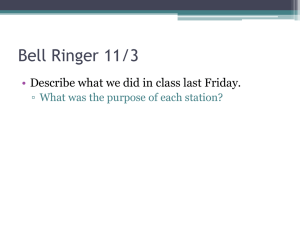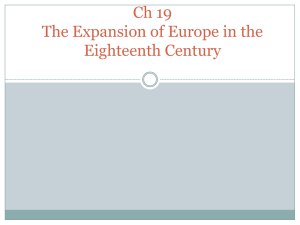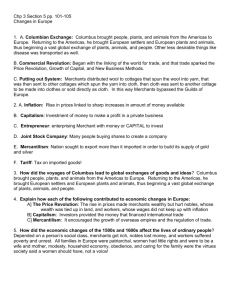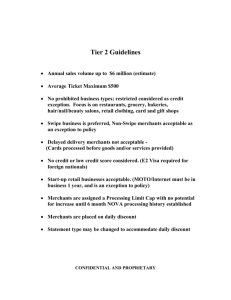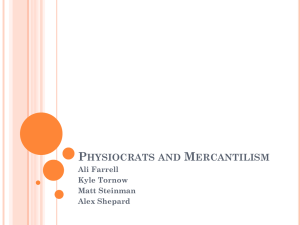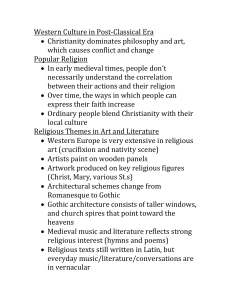How did the “putting-out” system work?
advertisement
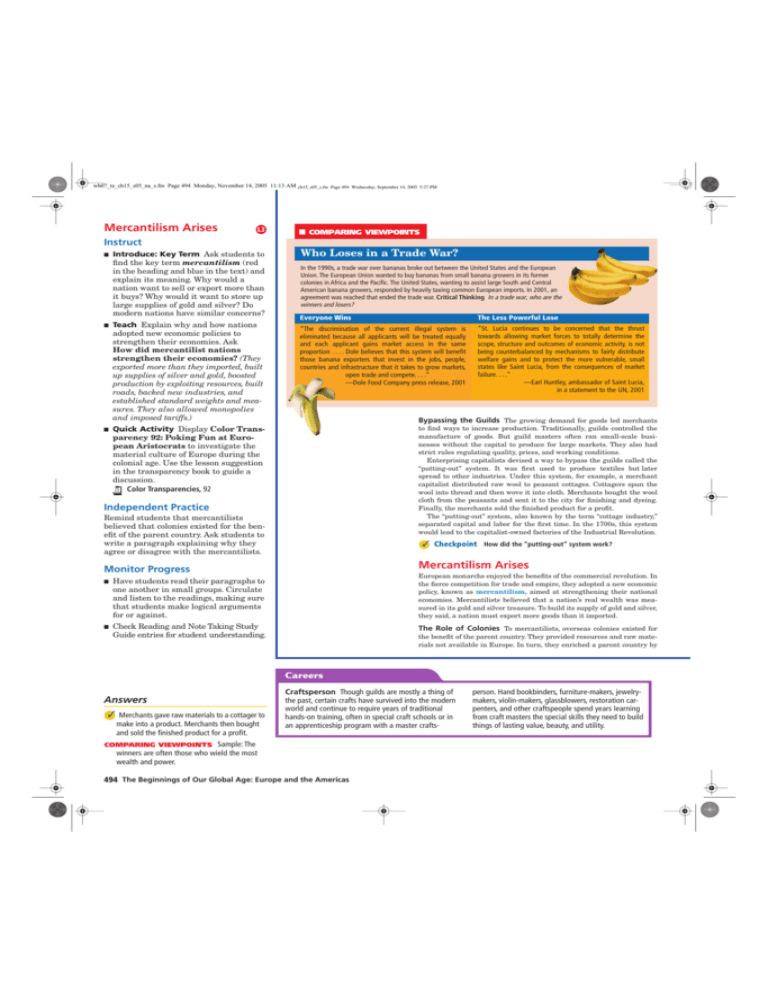
wh07_te_ch15_s05_na_s.fm Page 494 Monday, November 14, 2005 11:13 AM wh07_se_ch15_s05_s.fm Mercantilism Arises L3 Page 494 Wednesday, September 14, 2005 5:27 PM ■ COMPARING VIEWPOINTS Instruct ■ Introduce: Key Term Ask students to find the key term mercantilism (red in the heading and blue in the text) and explain its meaning. Why would a nation want to sell or export more than it buys? Why would it want to store up large supplies of gold and silver? Do modern nations have similar concerns? ■ Teach Explain why and how nations adopted new economic policies to strengthen their economies. Ask How did mercantilist nations strengthen their economies? (They exported more than they imported, built up supplies of silver and gold, boosted production by exploiting resources, built roads, backed new industries, and established standard weights and measures. They also allowed monopolies and imposed tariffs.) ■ Quick Activity Display Color Transparency 92: Poking Fun at European Aristocrats to investigate the material culture of Europe during the colonial age. Use the lesson suggestion in the transparency book to guide a discussion. Color Transparencies, 92 Who Loses in a Trade War? In the 1990s, a trade war over bananas broke out between the United States and the European Union. The European Union wanted to buy bananas from small banana growers in its former colonies in Africa and the Pacific. The United States, wanting to assist large South and Central American banana growers, responded by heavily taxing common European imports. In 2001, an agreement was reached that ended the trade war. Critical Thinking In a trade war, who are the winners and losers? Everyone Wins The Less Powerful Lose “The discrimination of the current illegal system is eliminated because all applicants will be treated equally and each applicant gains market access in the same proportion . . . . Dole believes that this system will benefit those banana exporters that invest in the jobs, people, countries and infrastructure that it takes to grow markets, open trade and compete. . . .” —Dole Food Company press release, 2001 “St. Lucia continues to be concerned that the thrust towards allowing market forces to totally determine the scope, structure and outcomes of economic activity, is not being counterbalanced by mechanisms to fairly distribute welfare gains and to protect the more vulnerable, small states like Saint Lucia, from the consequences of market failure. . . .” —Earl Huntley, ambassador of Saint Lucia, in a statement to the UN, 2001 Bypassing the Guilds The growing demand for goods led merchants to find ways to increase production. Traditionally, guilds controlled the manufacture of goods. But guild masters often ran small-scale businesses without the capital to produce for large markets. They also had strict rules regulating quality, prices, and working conditions. Enterprising capitalists devised a way to bypass the guilds called the “putting-out” system. It was first used to produce textiles but later spread to other industries. Under this system, for example, a merchant capitalist distributed raw wool to peasant cottages. Cottagers spun the wool into thread and then wove it into cloth. Merchants bought the wool cloth from the peasants and sent it to the city for finishing and dyeing. Finally, the merchants sold the finished product for a profit. The “putting-out” system, also known by the term “cottage industry,” separated capital and labor for the first time. In the 1700s, this system would lead to the capitalist-owned factories of the Industrial Revolution. Independent Practice Remind students that mercantilists believed that colonies existed for the benefit of the parent country. Ask students to write a paragraph explaining why they agree or disagree with the mercantilists. How did the “putting-out” system work? Mercantilism Arises Monitor Progress ■ Have students read their paragraphs to one another in small groups. Circulate and listen to the readings, making sure that students make logical arguments for or against. ■ Check Reading and Note Taking Study Guide entries for student understanding. European monarchs enjoyed the benefits of the commercial revolution. In the fierce competition for trade and empire, they adopted a new economic policy, known as mercantilism, aimed at strengthening their national economies. Mercantilists believed that a nation’s real wealth was measured in its gold and silver treasure. To build its supply of gold and silver, they said, a nation must export more goods than it imported. The Role of Colonies To mercantilists, overseas colonies existed for the benefit of the parent country. They provided resources and raw materials not available in Europe. In turn, they enriched a parent country by Careers Answers Merchants gave raw materials to a cottager to make into a product. Merchants then bought and sold the finished product for a profit. Craftsperson Though guilds are mostly a thing of the past, certain crafts have survived into the modern world and continue to require years of traditional hands-on training, often in special craft schools or in an apprenticeship program with a master crafts- COMPARING VIEWPOINTS Sample: The winners are often those who wield the most wealth and power. 494 The Beginnings of Our Global Age: Europe and the Americas person. Hand bookbinders, furniture-makers, jewelrymakers, violin-makers, glassblowers, restoration carpenters, and other craftspeople spend years learning from craft masters the special skills they need to build things of lasting value, beauty, and utility.
